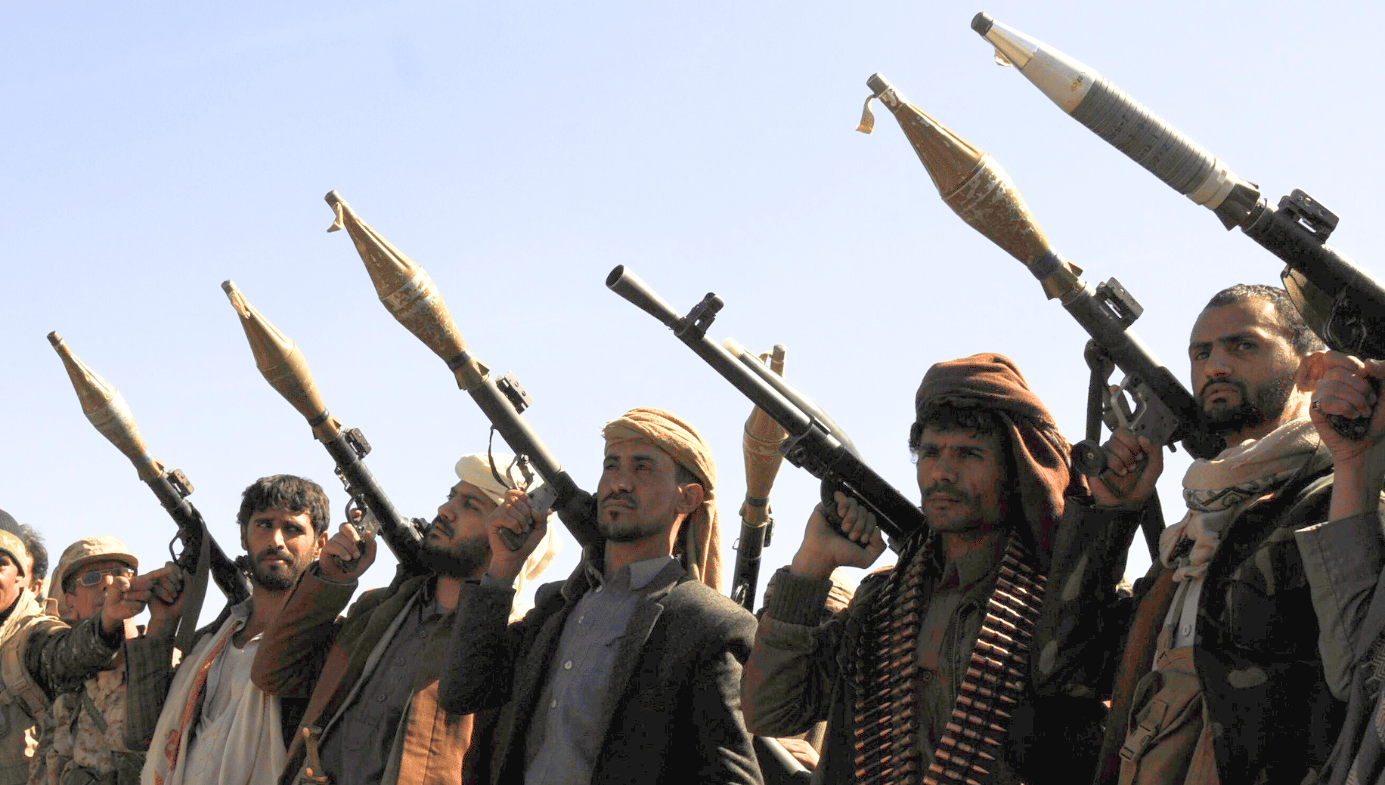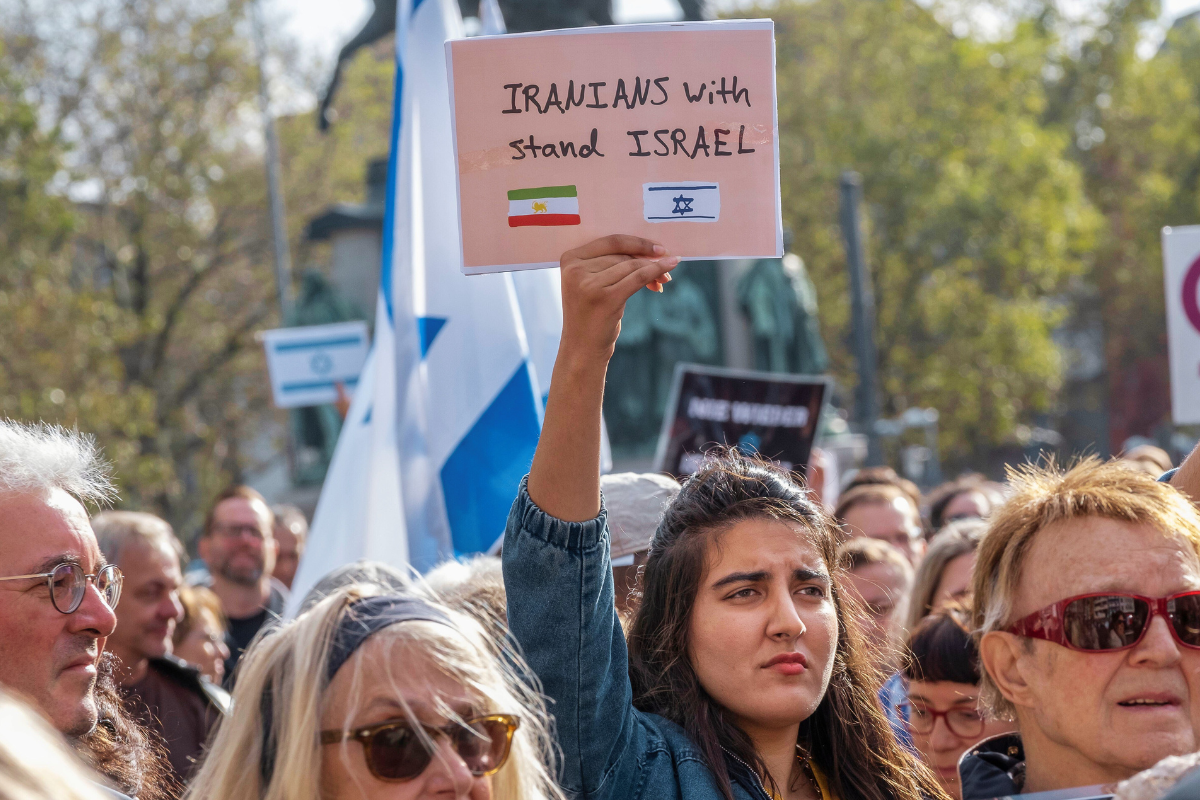Iran Contra Israel
The Iranian missile strike against Israel marks a watershed moment in the Middle East conflict, even though it was unsuccessful.

The Iranian missile assault on Israel in the early hours of 14 April has confronted the government in Jerusalem with a stark choice, with historic consequences: whether to retaliate in force, as most of the Israeli public wants, against significant Iranian targets—power plants, air force and Revolutionary Guards bases, nuclear installations—perhaps triggering a full-scale, open-ended Israeli–Iranian war; or to bow to America’s will, refrain from a military strike, and acquiesce in President Joe Biden’s effort to impose economic and diplomatic sanctions that he hopes will curb future Iranian adventurism, terrorism, and destabilising efforts in the Middle East.
Military retaliation against Iran would meet a psychological desire for revenge and demonstrate to the Arab and Muslim worlds, and especially to Iran’s proxies in the region—Hezbollah, the Houthis of Yemen, Hamas, Syria—that Israel is to be feared. But such a retaliation might alienate the Biden administration, which has stood by Israel since the Hamas attack on 7 October, and which is at pains to avert an expansion of the Hamas–Israel war into a full-fledged regional Middle East war, as Biden warned Israeli Premier Benjamin Netanyahu in their telephone conversation a few minutes after the Iranian missile strike. In that conversation, Biden assured Netanyahu that America’s commitment to Israel’s security remained “ironclad.” But he added that America and its allies in the G7 would prioritise diplomatic and economic efforts to curb the Iranians and would not join Israel if it struck Iran militarily.
The Israeli cabinet meeting later on 14 April ended without any decision, though the extremist right-wing ministers Police Minister Itamar Ben-Gvir and Finance Minister Bezalel Smotrich demanded an Israeli counterstrike on Iranian soil. Israel’s defence chiefs, the IDF, and Mossad were unanimous in favouring an Israeli military counterstrike, arguing that, in its absence, Israel would be seen as weak and its deterrent posture undermined. But one factor inhibiting a cabinet decision in favour of massive retaliation is the fact that the Iranian missile attack caused no Israeli deaths and relatively little damage.
But whatever the ministers eventually decide, there must be two things at the back of their minds: one is the spectre of Iran’s nuclear weapons programme, which most analysts believe is nearing completion—though they disagree on exactly how many months remain before Iran has the atomic bomb and the capacity to target it precisely. The second is the knowledge that Iran’s leaders have repeatedly vowed to destroy the Jewish state. For over a decade, Netanyahu has vowed to prevent Iran from obtaining nuclear weaponry. The Iranian missile attack is viewed by many as a golden opportunity to make good on this with at least a measure of international legitimacy, given the West’s unanimous condemnation of the Iranian strike.
But Israeli strategists fear that the IDF lacks the capability to severely maul the Iranian nuclear project on its own—and the Americans, who have the capability, remain steadfast in their reluctance to take on Iran, even though all American presidents, including Biden, have publicly committed themselves to preventing an Iranian bomb.
Some Israelis hope—and Biden probably fears—that an Israeli assault on the Iranian nuclear installations would somehow suck the Americans into the conflict and that they would then “finish the job.”
The United States, with assistance from the UK and Jordan, helped the Israel Air Force and Israeli anti-missile defences successfully thwart the Iranian missile strike. Israel has announced that “99 percent” of Iran’s drones and ballistic and cruise missiles were downed (though, according to subsequent American reports, some simply failed to fly and crashed) and that only one Israeli, a seven-year-old Bedouin girl, was injured. However, no one in Israel believes that the Americans (together with the Europeans) will ever resort to military force to halt Iran’s march to nuclear power status.
The only Israeli target hit by Iran was the Nevatim air force base in the Negev, which apparently sustained only minor damage. The Iranians claim that it was from there that the Israelis launched the F-35 stealth fighters that killed Muhammad Reza Zehadi and his aides in a building next to the Iranian Embassy in Damascus on 1 April. It was to avenge that assassination that the Iranians launched their missile strike two weeks later. Zehadi was an Iranian Revolutionary Guards general in charge of the Quds Force operations in the Levant, and as such orchestrated Hezbollah and Iranian proxy militia operations in Syria and Iraq (and possibly Yemen) against Israel, which in Israeli eyes rendered him a legitimate target.
Curiously, Israel’s success in thwarting the Iranian missile assault with America’s military assistance has left many Israelis less than euphoric. For one thing, Iran’s open defiance of America after Biden had warned them not to act has demonstrated, once again, that America’s standing as a Great Power has steadily diminished over the past decades.
While everyone understands that actual American military power remains robust, there is a perception of America’s weakness of resolve and reluctance to use force, rooted in two pre-Biden episodes. The first took place under President Obama in 2013, when Biden was vice-president, when Obama warned Syria’s President Bashar Assad not to use chemical weapons against his opponents in the Syrian Civil War. Despite Obama’s warning that this was a “red line,” Assad went ahead and used chemical weapons anyway and Obama refrained from doing anything in response. The second episode took place in September 2019. In a kind of preview of the recent assault on Israel, Iran launched cruise missiles and drones against Saudi Arabia’s oil installations, causing major damage, yet President Trump did nothing to help America’s ally. (In the 14 April assault, the Iranians launched more than 10 times as many missiles: at least 110 ballistic missiles, 30 or so cruise missiles, and more than 170 drones.)
To this catalogue of incidents highlighting American irresolution and lack of resolve, we should add Washington’s striking reluctance to provide Ukraine with F-16 fighters and various advanced munitions and, of course, America’s unsuccessful wars in Iraq and Afghanistan, culminating in the shameful retreat from Kabul. This is not how Great Powers behave.
In the context of the current Middle East war, Biden said “don’t” back in October, in the hope of deterring Iranian and Hezbollah involvement, just after Hamas’s savage assault on southern Israel. Washington even sent a naval task force to the region. Nonetheless, Hezbollah and the Houthis, obviously directed or at least authorised by Tehran, went ahead and launched their wars of attrition against northern Israel and in the Bab al Manad straits—and the two groups have persisted in, respectively, launching daily rockets at Israeli military positions and communities and in launching rockets against both Israeli and non-Israeli shipping in the Red Sea. Indeed, the day before their missile strike against Israel, the Iranians, in defiance of international law, brazenly hijacked a Philippines ship in the Straits of Hormuz at the entrance to the Persian Gulf. Clearly, Tehran does not fear Washington’s wrath.
How exactly the Iranian attack of 14 April and its frustration will affect the war in Gaza is unclear. The Iranians may have wanted to signal their support to Hamas—even though the attack appears to have been mainly motivated by Iranian calculations regarding their own position in the Middle East. Since launching its assault on Israel’s southern border communities on 7 October, Hamas has hoped to widen its war with Israel and ignite a regional war, involving Iran and its other proxies, who might rain down missiles on Israel from the north, east and south. The mini wars of attrition Hezbollah is waging from Lebanon and the Houthis from Yemen have only partly fulfilled Hamas’s hopes. Perhaps the Hamas leaders see the Iranian missile strike on Israel as a further token of regional support for their war.

On Israel’s part, the country has certainly drawn comfort from the fact that Jordan helped to block the Iranian strike (the Jordanians reportedly shot down several Iranian drones), and Washington certainly views Jordan’s cooperation as a sign that its plans to consolidate an Arab Sunni bloc to impede Iran’s ambitions to dominate the Middle East are bearing fruit. We should expect an improvement in Israeli–Jordanian relations over the coming weeks.
But the key question is whether Israel will agree to join the emergent bloc, which Biden has been advocating since 7 October, even if it entails accepting a two-state peace settlement with the Palestinians (which would imply eventual Israeli withdrawal from the occupied West Bank and perhaps East Jerusalem) and allowing the Ramallah-based Palestinian Authority to take over the Gaza Strip after Israel completes its withdrawal when the war with Hamas comes to an end.
So far, Netanyahu has agreed to neither of these conditions and is unlikely to agree to them in the future, given his desire to maintain his right-wing coalition government. This is a major reason why Washington—together with Israel’s liberals and left-wingers—is seeking Netanyahu’s ouster as quickly as possible. The problem is that Netanyahu’s ruling coalition controls 64 seats in Israel’s 120-seat Knesset (parliament) and, unless a handful of coalition members defect, there is no way to unseat Netanyahu and his coalition before the general elections scheduled for 2026. Hence, Biden’s geopolitical plans are out of synch with internal Israeli politics.
Meanwhile, Israel has withdrawn most of its forces from the Gaza Strip, has allowed tens of thousands of Gazans to move from the southern end of the Strip back to their homes in the north, seems undecided about conquering the town of Rafah and its environs—the last piece of Gaza still under full Hamas control—and has reached a dead end in the negotiations for the return of the remaining hundred or so hostages whom Hamas abducted from Israel on 7 October. So far, Hamas has refused any deal and insists that Israel must definitively end the war and pull all its forces out of the Strip before Hamas will even contemplate an exchange of hostages for Palestinian terrorists (or “freedom fighters”) in Israeli prisons.

But, despite all this, the Iranian missile strike against Israel marks a watershed moment in the Middle East conflict, even though it was unsuccessful. This is the first time that Iran has hit Israel directly, without hiding behind or deploying proxies. It may well indicate the direction the Israel–Iran conflict will take in the coming months. Much depends on Israel’s response to the Iranian strike (which Iranian spokesmen have hailed as a major “success”) over the coming days.












